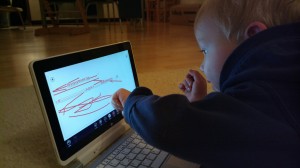
Does playing with a tablet slow a child’s verbal development? Maybe, maybe not. Photo by Steve Paine
When it comes to games for young children, one of the persistent worries parents and others express is the effects of allowing the very young to use smartphones or tablets.
A new study out of New York examines these worries, but is also an example of why you should be careful about reading too much into small surveys with potentially sweeping conclusions.
The new study, presented this weekend at the Pediatric Academic Societies, warns that the use of smartphones and tablets by children ages 0-3 may slow verbal development.
The survey grew out of one of the lead researcher’s observations of parents and children.
“We have observed in our neonatal clinic that the number one “toy” parents are giving their toddlers are smart phones,” said Ruth Milanaik, chief investigator of the study, in a prepared statement. “It was striking to see that parents were substituting books and general baby toys for smart phones. Many parents did not seem to bring any other distraction for their children except the touch screen devices.”
Milanaik is with the Cohen Children’s Medical Center of New York and she surveyed 65 families. The survey found nearly all of them had touchscreen devices and about 70 percent allowed young children play with them.
Key Findings
- Children in the survey started using devices when they were about 11 months old.
- Use of devices included: watching children’s “educational shows” (30%), using educational applications (26%), pressing buttons on the screen aimlessly (28%), and playing non-educational games (14%).
- 60% of parents self-reported educational benefits.
- Researchers found no difference in test scores between those kids who played with devices and those who did not.
- Researchers found a small drop in verbal test scores for the 14% who reported playing non-educational games.
The research led Milanaik to say, “”Technology can never replace a parent’s interaction with his or her child. Just talking to your child is the best way to encourage learning.”
But one must be careful drawing too much from a study like this. It was built to test an existing American Academy of Pediatrics policy from 2011 that warned against allowing children under two from playing with touchscreen devices.
Also, one should be careful about how to consider the conclusions. In this case, 14 percent of the 44 families that allowed their children to play with devices allowed their children to play with non-educational games. This comes out to about 6 of the families.
This is not to say that the survey is wrong or the issues of allowing very young children to play with devices are not serious and worthy of study, but when the researchers seek to make larger declaratory statements about the role of digital media in the lives of young children, developers and others should take a hard look at the research before basing their plans on that work.
